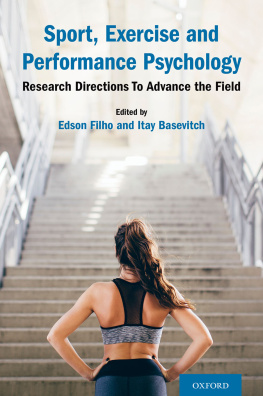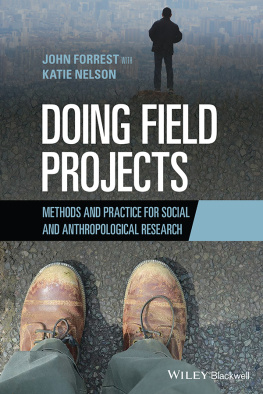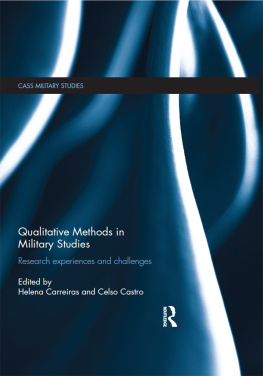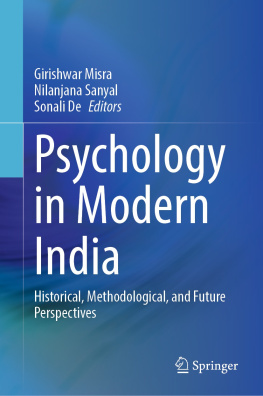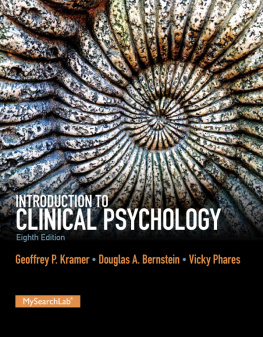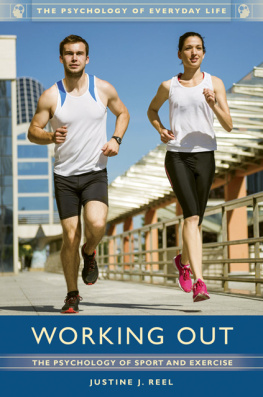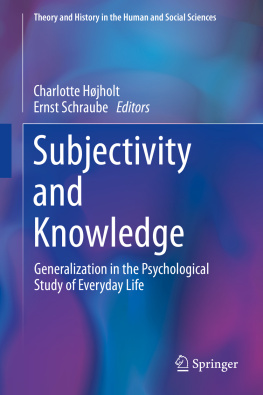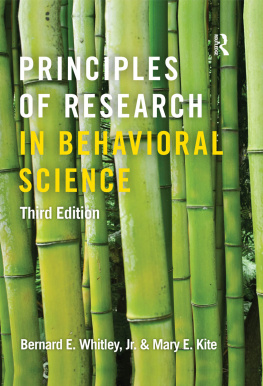Sport, Exercise and Performance Psychology

Oxford University Press is a department of the University of Oxford. It furthers the Universitys objective of excellence in research, scholarship, and education by publishing worldwide. Oxford is a registered trade mark of Oxford University Press in the UK and certain other countries.
Published in the United States of America by Oxford University Press
198 Madison Avenue, New York, NY 10016, United States of America.
Oxford University Press 2021
All rights reserved. No part of this publication may be reproduced, stored in a retrieval system, or transmitted, in any form or by any means, without the prior permission in writing of Oxford University Press, or as expressly permitted by law, by license, or under terms agreed with the appropriate reproduction rights organization. Inquiries concerning reproduction outside the scope of the above should be sent to the Rights Department, Oxford University Press, at the address above.
You must not circulate this work in any other form and you must impose this same condition on any acquirer.
Library of Congress Cataloging-in-Publication Data
Names: Filho, Edson, editor. | Basevitch, Itay, editor.
Title: Sport, exercise and performance psychology :
research directions to advance the field / Edson Filho, Itay Basevitch.
Other titles: Sport, exercise and performance psychology
(Oxford University Press)
Description: New York, NY : Oxford University Press, 2021. |
Includes bibliographical references and index.
Identifiers: LCCN 2021023962 (print) | LCCN 2021023963 (ebook) |
ISBN 9780197512494 (hardback) | ISBN 9780197512517 (epub) |
ISBN 9780197512524 (online)
Subjects: LCSH: SportsPsychological aspectsResearch. |
ExercisePsychological aspectsResearch | SportsPhysiological
aspectsResearch. | Self-efficacy. | Sports sciences.
Classification: LCC GV706.4 .S657 2021 (print) |
LCC GV706.4 (ebook) | DDC 796.01dc23
LC record available at https://lccn.loc.gov/2021023962
LC ebook record available at https://lccn.loc.gov/2021023963
DOI: 10.1093/oso/9780197512494.001.0001
Contents
Edson Filho and Itay Basevitch
Deborah L. Feltz and Mark R. Beauchamp
Ronnie Lidor and Gal Ziv
Christopher Mesagno, Felix Ehrlenspiel, V. Vanessa Wergin, and Peter Grpel
Christian Swann, Scott G. Goddard, Patricia C. Jackman, Matthew J. Schweickle, and Stewart A. Vella
Dave Collins and Hugh Richards
Robert Weinberg and Joanne Butt
Joe Baker and Brad Young
Itay Basevitch and Gershon Tenenbaum
Maurizio Bertollo, Marika Berchicci, and Selenia di Fronso
Sigal Ben Zaken
Edson Filho and Francisco Miguel Leo
Todd M. Loughead, Krista J. Munroe-Chandler, Matthieu M. Boisvert, and Katherine E. Hirsch
Brad Donohue, Gavin Breslin, and Shane Murphy
Panteleimon Ekkekakis and Mark E. Hartman
Selen Razon and Michael Sachs
Sarah Ullrich-French and Anne E. Cox
Michel Audiffren and Nathalie Andr
Daniel Gould and Michael Mignano
Roy David Samuel
Robert C. Eklund and J. D. DeFreese
Leslie Podlog, Stefanie Podlog, and Jeffrey G. Caron
Vassilis Barkoukis and Anne-Marie Elbe
Jack C. Watson II, Brandonn S. Harris, and Megan Byrd
Thierry R. F. Middleton, Robert J. Schinke, Brennan Petersen, and Cole E. Giffin
David Tod, Martin Eubank, Hayley E. McEwan, Charlotte Chandler, and Moira Lafferty
Itay Basevitch and Edson Filho
Edson Filho and Itay Basevitch
125 Novel Research Questions to Guide Future Research
in Sport, Exercise and Performance Psychology
Editors Positionality
Know thyself.
Oracle of Delphi
In Ancient Greece, thousands of people would visit the Temple of Delphi to ask questions about their future. A large scripture at the entrance of the temple reminded the visitors that before seeking knowledge about their future, they should be attuned to their present, inside world. In editing this book, we asked experts from around the world, each with a unique background and theoretical and methodological outlook, to propose questions that can propel the field of sport, exercise, and performance psychology into the future. We consider ourselves global citizens and holistic researchers, and as such, we believe that multiple theoretical stances and empirical methods are needed to study the manifold topics that exist in our field.
The idea for this book originated over a decade ago, when we were both graduate students, during a drive back to campus from our weekly Monday night soccer game. At the time we were both reviewing literature for our dissertations in search for gaps. On the return trip to campus, we talked about the difficulty of finding a meaningful research idea to inform our dissertations, and the challenges with navigating vast amounts of literature without knowing the key essential readingsthat is, Where do you start when your literature search returns hundreds of articles of both classic and contemporary literature? As the conversation progressed over the 25-minute drive, we discussed how most book chapters and peer-reviewed manuscripts conclude with a short section (usually one or two paragraphs) discussing avenues for future research; we connected the dots and this was a Eureka moment for us! We decided that night that one day we would edit a book together focusing on (a) open research questions that address the unknown in the field and (b) key readings for a given subfield or topic within the field of sport, exercise, and performance psychology. We were inspired by the writings of some of the best philosophers of all time, and we wanted to put forth a resourcer that could help students and seasoned researchers to identify some of the key questions that must be addressed to move our field forward. In essence, we envisioned the book to be a database of the most important questions to addressone of the main sourcers for researchers across the world and at various points in their career, updated every few years in accordance with theoretical, methodological, practical, and of course technological advancements in the field.
Philosophical Positionality
The Socratic Method: A Book About Questions
True knowledge exists in knowing that you know nothing.
Socrates
Socrates, the father of Western Philosophy, never ceased asking questions. We believe scholars need this curiosity and intellectual humility to advance the knowledge base across domains. To this day, the so-called Socratic Method is a fundamental pillar of scientific research and evidence-based practice (e.g., Overholser, 2018; Stenning et al., 2016). Research projects are based on questions that, when addressed properly, might provide us with answers and, most certainly, generate more questions. Likewise, practitioners informed by an evidence-based practice philosophy must ask their clients key questions (e.g., needs assessment or a performance profile) to design an effective and personalized intervention plan (Rousseau & Gunia, 2016). Put plainly, this book is primarily inspired by the Socratic Method. Each chapter starts with a brief overview of what we know followed by five open research questions about what we know that we dont know that should be addressed to move our field forward.
In Quest for Enlightenment: Theoretical, Methodological, and Applied Questions to Shed Light Into What We Know That We Dont Know

